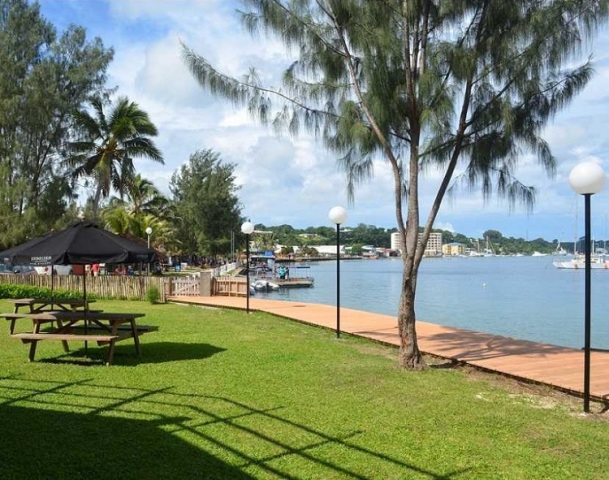Vanuatu is an island nation located in South Pacific Ocean. For some more interesting and fun facts about Vanuatu, read on.
Facts About Vanuatu
Vanuatu is an island nation situated in South Pacific Ocean. It is an archipelago that consists of more than 80 islands. Most of the islands are of volcanic origin. The island was initially inhabited by Melanesian people. In the 18th century, Europeans started settling here. In 1880s, France and United Kingdom claimed certain parts of the country. Finally in 1906, they arrived on an agreement for jointly administering the country, through a British-French Condominium, as the New Hebrides. However, an independent motion was moved in 1970s and finally, Vanuatu became independent in 1980. It has a written constitution and follows the parliamentary form of government. In terms of culture, this island is extremely diversified. The number foreign invasions here have influenced the native culture. Yet, one can find the predominance of the Melanesian culture in the central region of Vanuatu. For some more interesting and fun facts about Vanuatu, read on. 

Image: eGuide Travel@flickr
Fast Facts
Location: South Pacific Ocean
Area: 12,190 km²
Capital: Port Vila
Population: 224,564
Currency: Vanuatu
Official Languages: Bislama, English, French
Independence Day: 30 July 1980
Calling Code: +678
Type Of Government: Parliamentary republic
Interesting and Fun Facts about Vanuatu
- The official name of Vanuatu is 'Republic of Vanuatu'.
- Vanuatu is an archipelago, consisting of approximately 82 islands, which are of volcanic origin.
- The capital, and the largest city, of Vanuatu is Port Villa.
- The official languages of Vanuatu are Bislama, English and French.
- The currency of Vanuatu is Vanuatu vanu.
- The highest point in Vanuatu is Mount Tabwemasana, which has an altitude of 1,879 meters (6,160 ft.) and is located on the island of Espiritu Santo.
- Vanuatu lies in the Pacific Ring of Fire.
- Chief Roi Mata's Domain is a World Heritage Site in Vanuatu, consisting of three early seventeenth century sites, on the islands of Artok, Efate and Lelepa.
- In 1606, the Portuguese explorer, Pedro Fernandez de Quiros, in the service of the King of Spain, arrived in the Vanuatu archipelago.
- The island of Efate was named by Captain Cook, after his patron - Lord Sandwich.
- Christianity is the main religion followed in Vanuatu.
- The traditional drink of Vanuatu is kava, which is made from the roots of piper methysticum.
- The national dish of Vanuatu is 'lap - lap', which can be either savory or sweet. It is made from a vegetable porridge, cooked in coconut milk.
- Vanuatu is acknowledged as a distinct terrestrial eco region, known as the Vanuatu rain forests.
- A lot of islands of Vanuatu have been colonized for thousands of years. There are archeological evidences dating back to 2000 B.C. The islands were home to Melanesians for over 2,500 years, until the 15th century when Europeans arrived which affected their culture.
- Vanuatu has a limited number of plants and animal species, in spite of its tropical forests. There are only 19 reptile species, found only on Efate, one of the important islands of Vanuatu.
- There are only three or four adult saltwater crocodiles in Vanuatu's mangroves. However, the island is rich in sea life with more than 4,000 species of deep-sea molluscs.
- According to the local tradition, tipping in Vanuatu is not practiced.
- The economy of Vanuatu depends largely on the agriculture, off shore financial services, fishing and tourism.
- Agriculture is a major source of income for about 65% of the population of Vanuatu.
- More than half of the population in Vanuatu is native Melanesians and the remaining population comprises of Europeans, Asians and other Pacific islanders.
- There are no regular military forces in Vanuatu. The Vanuatu police have a paramilitary force called the ‘Vanuatu Mobile Force’.
- In the northern part of Vanuatu the affluence of family is measured by how much one can donate.
- In Vanuatu, pigs, especially the ones with round tusks are, considered a symbol of wealth.
- In most villages of Vanuatu there are clubhouses known as ‘nakamals’, where people gather to drink ‘kava’ (a festive drink, like alcohol).
- Education in Vanuatu is not compulsory; therefore, the school admissions and attendance are among the lowest in the whole of Pacific.
- Nearly 80% of the population lives in the rural or isolated areas of Vanuatu.
- Food shortages in Vanuatu are rare as most people grow vegetables in their gardens. The island’s cuisine includes fish, root vegetables fruits, and vegetables. Most food is either boiled or steamed. Fried food is not much encouraged.
See also
More from iloveindia.com
- Home Remedies | Ayurveda | Vastu | Yoga | Feng Shui | Tattoos | Fitness | Garden | Nutrition | Parenting | Bikes | Cars | Baby Care | Indian Weddings | Festivals | Party ideas | Horoscope 2015 | Pets | Finance | Figures of Speech | Hotels in India : Delhi | Hyderabad | Chennai | Mumbai | Kolkata | Bangalore | Ahmedabad | Jaipur
- Contact Us Careers Disclaimer Privacy Policy Advertise With Us Lifestyle Sitemap Copyright iloveindia.com. All Rights Reserved.







